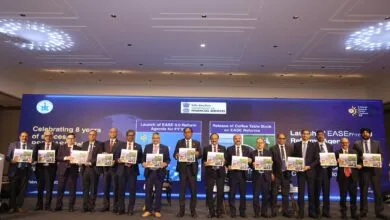ICICI Bank installed Atmospheric Water Generators at 5 offices across India

ICICI Bank has taken a significant step towards sustainability by introducing advanced technology that converts atmospheric moisture into drinking water. This initiative is part of the bank’s ongoing efforts to reduce its environmental impact and improve operational sustainability.


The bank has installed Atmospheric Water Generators (AWGs) at five of its offices across India, including locations in Bengaluru, Hyderabad, Mumbai, and two in Chennai. These units have the capacity to produce 8,000 liters of potable water each day, benefiting around 4,200 employees. The technology uses atmospheric moisture, turning it into 100% microbe-free, clean drinking water through a process that involves condensation, filtration, and the addition of essential minerals.
The AWGs are designed to function year-round, with a wide operating range for both temperature (18°C – 45°C) and humidity (25% – 100%), making them a reliable source of water even in varying climatic conditions.
Mr. Soumendra Mattagajasingh, Group Chief Human Resources Officer at ICICI Bank, emphasized the bank’s commitment to sustainability, stating, “At ICICI Bank, we are committed to conducting our business sustainably and responsibly to reduce the impact of our operations on the environment. Our strategy for environmental conservation is led by the 4R principle—reduce, reuse, recycle, and responsible disposal. By leveraging atmospheric moisture, we reduce our dependence on packaged water and make good use of this renewable resource.”
ICICI Bank’s efforts to boost sustainability are guided by its Environmental, Social, and Governance (ESG) policy. The bank aims to achieve carbon neutrality in Scope 1 and Scope 2 emissions by 2032. It has already made significant strides, with more than 180 of its locations covering nearly 5 million square feet being certified by the Indian Green Building Council (IGBC) as of March 2024. Additionally, its Service Centre at Bandra-Kurla Complex (BKC) in Mumbai was awarded ‘Net Zero Waste’ certification in fiscal 2024.
The bank’s renewable energy consumption has also seen a substantial increase, with a 4-fold rise to 75.73 million kWh in fiscal 2024 compared to the previous year. Moreover, ICICI Bank has planted 3.7 million trees since fiscal 2022 and created a water harvesting potential of 25.8 billion liters annually across schools and water bodies.
About ICICI Bank: ICICI Bank Ltd is one of India’s leading private-sector banks. As of December 31, 2024, the bank’s total assets amounted to ₹20,13,343 crore. ICICI Bank is listed on the Bombay Stock Exchange (BSE), National Stock Exchange (NSE), and New York Stock Exchange (NYSE).
